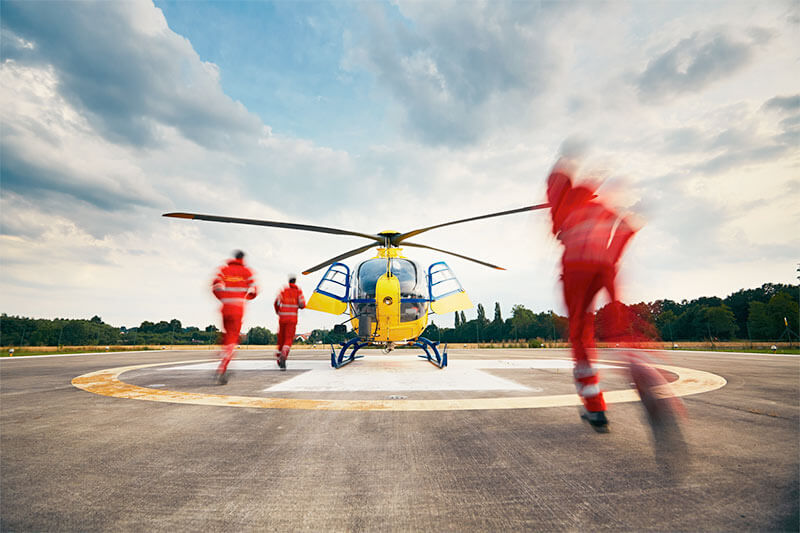In a perfect world, there would be ample time to transport patients without risking a decline in their condition. Unfortunately, as we all know, we live in a rather imperfect world. When a patient needs urgent care, such as from a scene of an accident or transferred to another hospital, sometimes traditional ground transportation isn’t fast enough. In these serious scenarios, we must turn our eyes to the sky. Considered one of the most dynamic and adventurous nursing careers, Flight Nurses are part of a small team responsible for transporting seriously injured or sick patients. While this profession isn’t right for everyone, if you constantly seek out adventure and wish to make a serious difference in the lives and care of patients, then a career as a Flight Nurse may be for you.
Whether you’re already working as a Registered Nurse, or want to investigate your future opportunities, let’s dive into the high-flying world of becoming a Flight Nurse.
Defining Courage – What is a Flight Nurse?
In essence, a Flight Nurse is exactly what its name suggests. Sometimes known as a Transport Nurse, these specialized Registered Nurses are part of a small healthcare team responsible to transport patients in aircraft. Other members of this team include physicians, flight medics and specialized healthcare professionals based on patient status and condition.
Instead of working in a hospital, Flight Nurses work in aircraft, such as helicopters or rescue flights. For example, after a serious accident where a patient is critically injured, instead of transporting them via an ambulance, they are boarded onto a rescue helicopter. Its within the confines of this rapid transit environment a Flight Nurse performs lifesaving procedures to stabilize a patient as best as possible.
The primary function of this action packed nursing career is to maintain patient stability until the aircraft arrives at the hospital. As with many other nursing specialties, Flight Nurses are able to work in both military and civilian environments.
While the essential functions of this role are relatively similar to those of a standard Registered Nurse position, there are several unique requirements, which we’ll discuss below.
Flight Nurse Roles and Responsibilities
As with any nursing profession, there can be exceptions and unique circumstances dictating daily job functions and responsibilities. However, there are several universal job duties that are common for all Flight Nurses These include:
• Organizing and updating patient paperwork and medical charts
• Offering immediate emergency medical care throughout transportation, which may include triage, treatment and overall assessment
• Provide lifesaving procedures, such as resuscitation, first aid and IVs
• Maintain and manage aircraft medical supplies and equipment via a standardized inventory tracking methodology
• Communicate with medical facility to ensure necessary equipment and personnel are standing by upon arrival
• Monitor and track vital signs
• Assist with the retrieval and delivery of patient, while ensuring the patient is safely secured throughout transport
How to Become a Flight Nurse – Overview
If you’re interested in becoming a Flight Nurse, then you must make sure you meet the standard experience and training requirements set forth by your State Board of Nursing. While these can vary throughout the country, there are several universal requirements.
The first, and most obvious, is holding an active nursing license. This requires undergoing an approved degree program and passing your state NCLEX examination and maintaining an active license.
While the following requirements are generally considered correct throughout the United States, certain Flight Nurse positions may require additional qualifications. For example, a Flight Nurse position that requires international travel will typically require previous flight experience as well as a valid passport.
Considering this, the following are the most common requirements to begin work as a Flight Nurse in the United States:
• At least 5 years of clinical experience within a Trauma, Emergency Room or ICU environment
• Able to successfully perform your job duties in a confined and challenging environment, such as a small helicopter cabin
• Advanced demonstrated knowledge of critical patient care, which should include ventilator equipment
• Be physically capable of handling the demands of the job, such as lifting and securing patients of all sizes
• Demonstrated leadership and communication skills, which are determined by your previous work experience in a hospital critical care unit
Flight Nurse Training and Certification Requirements
Beyond the standard training required by your state to earn a Registered Nurse license, Flight Nurses are typically required to undergo specific certifications. While an advanced degree is generally not required, many find it a valuable asset when applying for jobs and performing its duties. If you choose to advance your education, the most common is an MSN degree in critical care nursing or another related field.
To work in this dynamic position, you’re required to take and pass the Certified Flight Registered Nurse (CFRN) designation overseen by the Board of Certification for Emergency Nursing. Along with this standardized designation, Flight Nurses are often required to hold the following certifications:
• Advanced Cardiac Life Support (ACLS)
• Pediatric Advanced Life Support (PALS)
• Basic Life Support (BLS)
• Transport Professional Advanced Trauma Course (TPATC)
• Critical Care Registered Nurse (CCRN) or Certified Emergency Nurse (CEN)
Flight Nurse Salary and Employment Outlook
While compensation isn’t typically a major driving force behind the desire to become a Flight Nurse, it certainly doesn’t hurt. As with any other nursing profession, the actual income potential varies based upon your state and metropolitan area. Considering this, the Bureau of Labor Statistics reports that Flight Nurses earn an average of $68,050 per year. However, it’s worth noting that annual salaries can vary from $50,000 to over $95,000 per year based upon experience and region.
In terms of employment outlook, Flight Nurses are expected to match the anticipated job growth for all nursing professions. Based upon location, this ranges anywhere from 11% to over 25% by the year 2026.
Although this isn’t a career option for everyone, if you wish to make a tangle difference in the lives of patients while providing critical care in a fast paced and adventurous environment, then you should consider a career as a Flight Nurse. To learn more about your local opportunities, speak with your local hospitals or communicate with your State Board of Nursing, who will have explicit training and work experience requirements as it applies to you.






